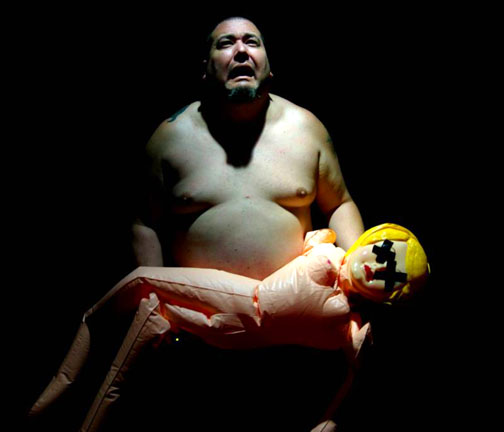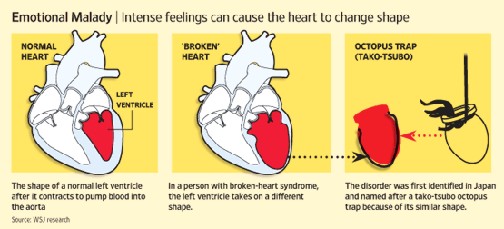Tags
Yup, R.E.M. was right. Love Hurts. We’ve all been there. The romance is over, the relationship finished, and life as we knew it is at an end. Emotionally a wreck, the pain of loss almost seems physical at times. And then some fool tells you it’s better to have loved and lost than to never have loved at all.
Asshole.
Friends sympathize at first, and then quickly tire of sharing your pain. Besides they all thought he wasn’t good for you in the first place. Love is a powerful emotion, no more so than when it’s love that has gone on the rocks. The pain of breakup is intense. And no one understands what you’re going through. Maybe, with time, you’ll get better. But how do you mend a broken heart?
It turns out that the pain you feel to the depth of your soul is real. It’s not just your silly emotions fucking with you. The pain you feel isn’t just in your head, it’s physical.
And yup, it smells like science to me.
The symptoms of heartache may vary from one person to the next. They range from withdrawal from friends and family to physical sickness and pain. It can feel like you’ve lost a part of yourself, and its not far-fetched to say that you feel completely empty inside. There’s an ache, a deep ache; the pain is real and there’s no other way to describe how bad it hurts than to call it heartbreak. It’s the muse for thousands of country & western songs; a longing for the past and the pain of feeling completely empty and abandoned. It makes it hard to get up in the morning and to get through the day. Loss of appetite, insomnia, headaches, a ton of tears, panic attacks, fatigue, and the feeling of loneliness and hopelessness are all typical responses of the broken hearted. And it causes changes to the flow of blood in your brain.
The part of your brain that regulates physical pain and distress becomes more active during bouts of heartache. It’s a form of depression that physically triggers a variety of responses, one which results in the experience of physical pain. Heartache can cause thickening of artery walls and those suffering the pain of breaking up are more at risk to develop heart disease and other cardiovascular diseases. According to studies on heartbreak and how it affects people, the connection between emotional pain and a literal form of heartbreak – a heart attack – is real. It’s known as the Broken Heart Syndrome.
A broken heart is not just a period of emotional sadness. In some cases it is a traumatic physical event too. Broken Heart Syndrome is known in the medical world as Takotsubo cardiomyopathy, which often occurs due to an emotional shock. A recent article in the Journal of the American College of Cardiology noted stress-related acute heart failure mimics heart attacks, but appears to have little connection with coronary artery disease. Instead, it’s typically triggered by acute emotional trauma that releases a surge of adrenaline that overwhelms the heart. The effect is to freeze much of the left ventricle, the heart’s main pumping chamber, disrupting its ability to contract and effectively pump blood. ‘It’s really a heart attack which is triggered by stress rather than by a blocked artery,” says Scott Sharkey, a cardiologist at Minneapolis Heart Institute.
Based on electrocardiographic and blood tests for heart damage, patients seem to be having a heart attack but cardiologists find no blockages in the coronary arteries. These patients can be difficult to manage for emergency physicians and cardiologists alike,” says Brown University cardiology fellow Richard Regnante, M.D. “They may be in cardiac arrest, cardiogenic shock, or severe heart failure. They may require advanced life support with airway management and medications to support blood pressure.”
A recent study monitored 40 patients diagnosed with Broken Heart Syndrome at two major hospitals in Rhode Island over a period of nearly 3 years. Each patient exhibited stress hormone levels (like adrenaline) two to three times higher than in an actual heart attack, and seven to 34 times higher than normal.
”Our hypothesis is that massive amounts of stress hormones go right to the heart and produce a stunning of the heart muscle that causes this temporary dysfunction resembling a heart attack,” reported Ilan S. Wittstein of the Johns Hopkins School of Medicine in Baltimore. “It doesn’t kill the heart muscle like a typical heart attack, but it renders it helpless.”
And helpless is just what most of us feel when suffering a broken heart.
The Minneapolis Heart Institute and Abbott Northwestern Hospital also conducted research into the broken heart phenomenon. Over a period of about seven years, 136 patients were admitted to the emergency room or hospital exhibiting symptoms of a heart attack, but without clogged arteries. Most patients complained of substantial chest pain, shortness of breath, and loss of consciousness (e.g. fainting). The researchers conducting follow up studies of those patients wanted to “define more completely the clinical spectrum and consequences of Broken Heart Syndrome beyond the acute event.”
Despite finding that you can recover fully from a broken heart, the researchers were unable to determine what the long-term consequences are. They did, however, discover that the survival of the broken hearted was reduced compared to that expected for those of similar age and gender. In each case resulting in death, mortality was due to non-cardiac diseases (predominantly cancer), most frequently in the first year following the initial cardiological event. Their data suggest that a broken heart can lead to future of generally impaired health and well-being. Depending on what you consider to be good odds, the researchers did find that one-third of the patients who survived their initial bout of broken heartedness went on to achieve normal life expectancy.
Psychologists who have studied the syndrome in its emotional representation rather than its physical symptoms say that those dealing with heartbreak follow patterns similar to the stages experienced by people dealing with the death of a loved one: Shock and Denial; Pain and Guilt; Anger and Bargaining; Depression, Reflection, and Loneliness; and finally Acceptance. They report that eventually the situation is fully accepted and, although happiness may not return for some time, the ability to move forward occurs.
How do you mend a broken heart? According to the psychologists, it’s a matter of time allowing your emotions to run their course, which echoes the paraphrased advice of Chaucer: time heals all wounds. Someone, possibly Shaun Alexander, added additional advice to strengthen that quote: Time heals all wounds, unless you pick at them. Drowning your sorrows with a playlist that only includes the Bee Gees’ and Al Green’s renditions of How Do You Mend A Broken Heart? ain’t gonna cut it. But then experts will tell you the best way to prevent any tragedy is to be prepared. And Since Valentine’s Day is tomorrow, you’d better be prepared for that broken heart.
A survey conducted last year found that Valentine’s Day – which is touted as the day of love – was the day chosen by almost half of young people in Australia for breaking up. According to a Galaxy Research survey of more than 1200 people aged 18-39, 47 percent decided to celebrate Valentine’s Day by breaking up.
The day was even more unpopular with those who decided to stick it out a bit longer. 57 percent stated they did not like the day nor did they want to celebrate it as the most romantic of the year. And almost half of respondents said Valentine’s Day was a cynical marketing exercise designed to make couples shower each other with flowers, chocolates or underwear, while one-in-four singles saw it as a day of dread and a time to feel bad about themselves. But then fatties will always find something else to blame rather than their inability to exercise a bit of self-control and put away the half gallon of Häagen-Dazs before they’ve polished it off.
Valentine’s Day is supposed to be a romantic holiday and the day of unfettered romance. But for those who feel Cupid’s arrow has dulled, it’s a better day than New Years to ring out the old. The survey found that as many as one-in-three unmarried couples used February 14 to reconsider their relationship, while one-in-four admitted to staying in a relationship over Valentine’s Day even though the relationship had lost its spark.
Social commentator and author Zoe Foster, who co-wrote Textbook Romance, says that while for some couples Valentine’s Day could be filled with happiness it is also a time when many couples assess their relationship and look at options. It seems that nothing quite says Happy Valentine’s Day like breaking up. “Almost half of young people will actually break up with their partner around Valentine’s Day,” says Foster. “It’s almost what you could consider break-up season.”
If you decide to jump on the bandwagon and end your romance as your contribution to the Valentine’s Day celebrations this year, don’t be too worried about the negative effects it’ll have on your ex-beloved. Despite what Neil Sedaka thought, breaking up is not hard to do. And its bark is worse than its bite.
A new Northwestern University study shows that lovers, even those madly in love, do much better following a breakup than they imagined they would. Researchers found that participants who forecast how badly they would feel over a breakup with a partner actually felt much less distress than they had predicted in the days prior to the relationship’s demise.
“Our research shows that a breakup is not nearly as bad as people imagine, and the more you are in love with your partner, the more wrong you are about how upset you are going to be when the dreaded loss actually occurs,” said Eli Finkel, assistant professor of psychology in Northwestern’s Weinberg College of Arts and Sciences and co-author of the study.

Cupid is really aiming at your wallet, not your heart. Those who are celebrating Valentine’s Day are going to spend an average of $126.03 in 2012, up 8.5% from last year.
The study, published in The Journal of Experimental Social Psychology, found that while the people most in love did experience a little more distress over their breakups, on average people demonstrate remarkably poor insight when asked to predict the magnitude of their distress following the emotional event. According to researchers, whether the discrepancies between people’s predicted and actual distress are caused by their inability to foresee positive life events on the horizon or their inaccurate theories about how quickly they can recuperate, a romantic breakup seems to be less upsetting than the average individual believes it will be.
“Their levels of distress were nowhere near their catastrophic predictions,” reported Finkel. He felt their misguided predictions were due to focusing on the negative results of a breakup, and that people seldom take into account the positive outcomes that follow a breakup, such as the benefits of being single.
So there ya have it: Love hurts. For real. No one likes the day set aside for love and romance. And despite what you’ve heard, breaking up is not hard to do (and even easier these days thanks to the advent of texting).
Happy Valentine’s Day Bitches!







I just saw a news story about this the other day. Some old couple who had been married for 60+ years. She died and then he died within something like 90 minutes. Apparently this phenomenon happens relatively frequently. But this was a more extreme case.
Sounds morbid to say ‘how sweet’ but geeze, that’s romantic! More women suffer from broken heart syndrome than men, but it is not uncommon among the elderly who have been with the same spouse for 50+ years.